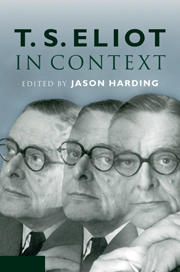Book contents
- Frontmatter
- Contents
- List of illustrations
- List of contributors
- Acknowledgements
- List of abbreviations
- Introduction
- PART ONE LIFE
- PART TWO FORMS
- PART THREE LITERARY CROSS-CURRENTS
- PART FOUR POLITICS, SOCIETY AND CULTURE
- 26 Politics
- 27 Economics
- 28 Anti-Semitism
- 29 Gender
- 30 Religion
- 31 Philosophy
- 32 Social science
- 33 Natural science
- PART FIVE RECEPTION
- Further reading
- Index
29 - Gender
Published online by Cambridge University Press: 05 August 2012
- Frontmatter
- Contents
- List of illustrations
- List of contributors
- Acknowledgements
- List of abbreviations
- Introduction
- PART ONE LIFE
- PART TWO FORMS
- PART THREE LITERARY CROSS-CURRENTS
- PART FOUR POLITICS, SOCIETY AND CULTURE
- 26 Politics
- 27 Economics
- 28 Anti-Semitism
- 29 Gender
- 30 Religion
- 31 Philosophy
- 32 Social science
- 33 Natural science
- PART FIVE RECEPTION
- Further reading
- Index
Summary
‘The sex-gender system … is both a sociocultural construct and a semiotic apparatus, a system of representation’; it is also historical, imbedded in personal subjectivity and general ideology, and the site of multiple contradictions. Yet throughout significant decades of modernist literary criticism, no one examined sex-gender materials in particular, although sexuality often incurred comment. This was despite fervent debates and social politics about war, suffrage, the new woman, professions opening to women, and many socio-political manifestations of change around gender and sexuality in modernity: sexology, the criminalisation of homosexuality, transgressive feminine masculinities, lesbianism, homoeroticism, eugenicist schemes and fears about virility. Further, no ‘gendered’ reading exists in isolation from other social materials – in the case of T. S. Eliot, consideration of nationality (twofold), religious culture, sexuality, class and ethnic materials intersect with gender; each inflects the other.
Eliot's biography provides one zone for gender/sexuality readings. Lyndall Gordon points to maternal influence, noting Charlotte Eliot's upstanding late Victorian poems of religious and moral conviction and Eliot's admiration for her work. The singular, strained and even ‘possum-like’ treatments of women in Eliot's life are striking: from the creatively vibrant but unstable Vivien Haigh-Wood, his first wife, to the woman he admired from afar, Emily Hale, who wanted more than Eliot could give, to Mary Trevelyan, his pal in later life, up until the safe harbour of the marriage of his last seven years with Valerie Fletcher, a figure of love, care, comfort, posthumous editing and executorship.
- Type
- Chapter
- Information
- T. S. Eliot in Context , pp. 295 - 304Publisher: Cambridge University PressPrint publication year: 2011



